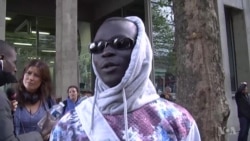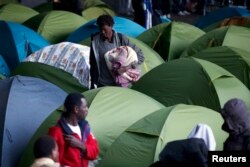As France begins welcoming its first batch of Iraqis and Syrians for resettlement from elsewhere in Europe, questions are mounting over the status and treatment of longer-term migrants.
French President François Hollande last week pledged to take in 24,000 refugees over the next two years, and authorities are scrambling to find housing for the new arrivals.
But, out of the media spotlight, Paris authorities are less welcoming to some African migrants who’ve wound up sleeping in the street for months. On Thursday, hundreds of these migrants were evacuated from two temporary camps.
One was a tent camp by the Seine River in downtown Paris – the only home 18-year-old Ahmed has known since arriving from Sudan. "They talked to us, they take people from here to residence," he said of the authorities. "But we don’t know where is the residence."
The other squatter site was across town at an abandoned high school, which several hundred migrants had occupied.
Nasrullah Daulatzia had been sleeping in the streets for months until arriving at the high school. "It’s great, it’s nice – better than sleeping outside," the Afghan said.
France's newest influx of asylum seekers – Iraqis and Syrians – are getting very different treatment. All have housing, and they’ve been issued temporary papers. Authorities are seeking more space to shelter thousands more expected in the coming months
Activist Herve Ouzzane claimed French authorities are establishing quotas for Syrians and Iraqis because they come from conflict-torn countries. But he said there's been no talk of quotas for Sudanese or Eritreans such as those those living at the school. He said many of the Africans also are political refugees.
Mathias Vicherat, chief of staff for Paris Mayor Anne Hidalgo, was at hand when the tent camp along the Seine was evacuated. He said the city wants to handle all cases of all migrants and asylum seekers, but there are priorities for each situation.
Paris city hall is opening up new migrant shelters. Those from the tent camp will get temporary housing while their situations are reviewed. Like Ahmed, they face an uncertain future.






